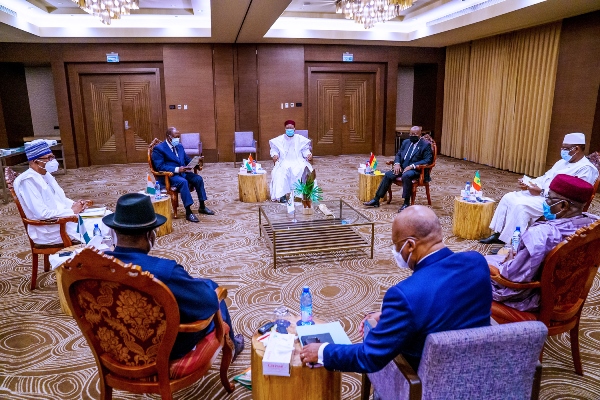The Central Bank of Nigeria (CBN) has deployed members of staff to embark on sensitisation of Nigerians to the policies concerning the new banknotes, deadlines, distribution, and usage of the redesigned currency.
In Imo branch officials of CBN on Wednesday visited Owerri relief market to sensitise traders on the need to deposit their old notes in the banks before the January 31 deadline.
The exercise is part of efforts to introduce the newly-redesigned naira notes to the traders and urged them to accept them as legal tender.
Addressing the traders, the Branch Manager, Mrs Boma Oruwari, said that the banknotes that were being phased out remain legal tender till January 31, 2023.
She said that as such, they should not be rejected as a means of exchange for the purchase of goods and services.
According to her, the old notes were phased out for a variety of reasons, including shortage of clean and fit bank notes, counterfeiting, high cost of cash management and abuse of the naira.
“These issues and challenges made the Central Bank to change and redesign the higher denominations of N1,000, N500 and N200 bank notes.’’
In Ondo state, officials sensitised traders in the popular Oja Oba and Adedeji Markets to the economic benefits of the newly redesigned Naira notes.
The bank said that currency management in Nigeria had faced several challenges that had continued to grow in scale and sophistication with unintended consequences for the integrity of both the CBN and the country.
Speaking at the sensitization, the Akure Acting Branch Controller of CBN, Mr Samuel Giwa, said there was significant hoarding of banknotes by some members of the public.
Giwa stated that statistics showed N2.72 trillion out of the N3.26 trillion currency in circulation as of June 2022 was outside the vaults of commercial banks across the country, and supposedly held by members of the public.
According to him, the statistics shows that 84.71 per cent of currency in circulation are outside the vaults of commercial banks, with only 15.29 per cent in the CBN’s vaults.
He added that there was worsening shortage of clean and fit banknotes with attendant negative perception of the CBN and increased risk to financial stability.
Mrs Emily Adesida, an official of Adedeji Market, appreciated the CBN for the sensitization, saying it was a good step toward a new economy.
At Wunti Market in Bauchi, CBN urged traders to embrace the policy of the redesigned Naira notes.
Mr Sulaiman Laido, acting Branch Controller, CBN, Bauchi, while speaking at the campaign urged traders to embrace the redesigned currency notes as the country’s legal tender.
He also reminded them that the old denominations would cease to be legal tender on January 31.
The acting controller who led the team, along with officials of commercial banks operating in Bauchi assured the traders that they would not be charged any fee irrespective of the amount they deposited in the banks.
“It will also help with better design and implementation of monetary policy as the country will have much more accurate data on money supply and monetary aggregate.
“We believe that this exercise will help in increasing financial inclusion, moving towards a more cashless economy and ensuring greater formalisation of the Nigerian economy.
“The currency redesign will also assist in the fight against corruption, as the exercise will rein in the higher denomination used for corruption, and the movement of such funds from the banking system could be tracked easily,” he said.
The National Orientation Agency (NOA) in collaboration with the CBN also embarked on public awareness campaign on the naira notes redesign across the 13 local government areas of Ebonyi.
The team had taken the campaign to Traditional Institutions, Churches, Mosques, schools and market places in the state.
The three redesigned denominations of N1, 000, N500 and N200 banknotes were unveiled on Nov. 23, 2022, by President Muhammadu Buhari.
Dr Desmond Onwo, NOA’s Director in the state said on Wednesday in Abakaliki, that the essence of the campaign was to properly educate the general populace on the new currencies.
Onwo said there was the need for the reorientation of Nigerians in order to promote cashless policy and checkmate illegal transactions among others.
“The idea of the new currencies was to reduce fake currencies and check expenditures among citizens.
“We urge the general public to deposit their old Naira notes in their bank accounts before the deadline of Jan 31,’’ he advised.
Mrs Anthonia Ekezue, the Central Bank of Nigeria (CBN) representative, said that the newly introduced currencies were aimed at stampeding counterfeits, reduce expenditures as well as tracking illegal transactions.
“The benefits of the currency redesign will help to control inflation as the exercise will bring the hoarded currency into the banking system, thereby, making monetary policy more effective.
“It will also assist in the fight against corruption as the exercise will rein in the higher denomination used for corruption, and the movement of such funds from the banking system can be tracked easily.
“Accept the new denominations and remember that the apex bank will not go back on the new currency policy. The old currencies will cease to be a legal tender by Jan. 31,’’ she said.
Ekezue urged traditional rulers to carry out the message and ensure that the people accept it as our national identity.
The Chairman of South-East Traditional Rulers, His Royal Majesty, Chief Charles Mkpuma urged CBN to ensure the new currencies were in circulation.
Mkpuma said that he had only seen N1, 000 of the new currencies since it was introduced.
Also speaking, Rev. Peter Chukwu of Abakaliki Catholic Diocese commended the Federal Government for redesigning the currencies.













